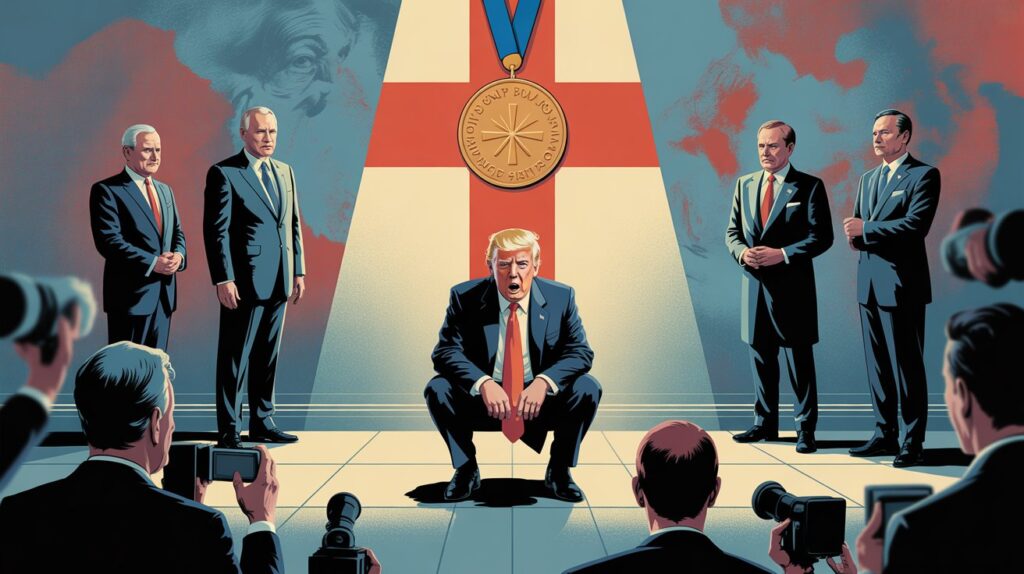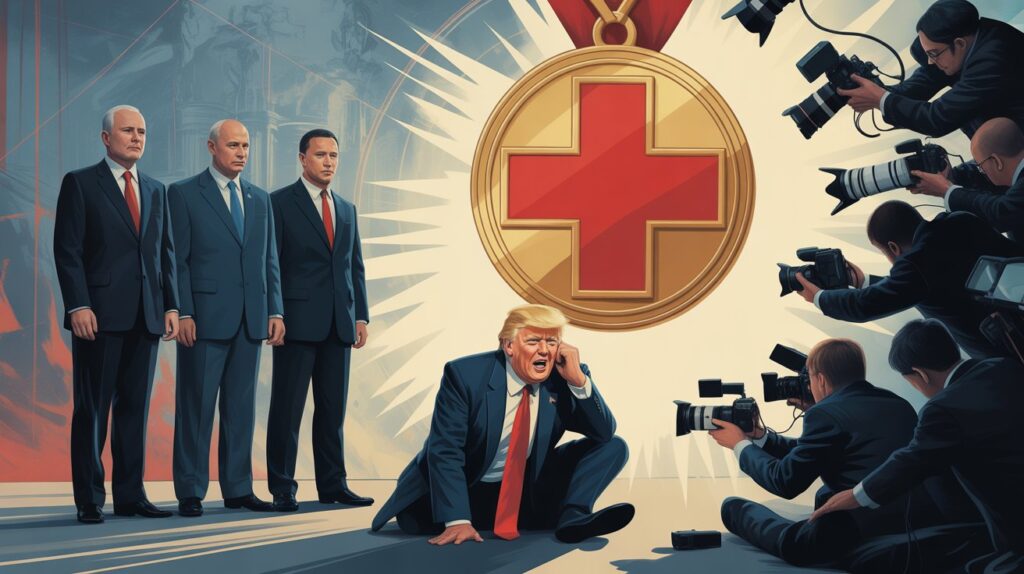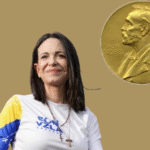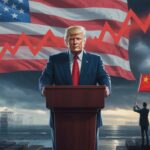Discover why Donald Trump Nobel Peace Prize hopes collapsed, how his obsession shaped U.S. foreign policy, and why María Corina Machado 2024 win served key geopolitical interests.
The Prize that Went to a Rival’s Target
The week of the Nobel Peace Prize announcement usually brings suspense, but the 2024 decision triggered a political shockwave. For months, Donald Trump orchestrated a highly public campaign for the Donald Trump Nobel Peace Prize, sharing praise-filled articles, touting peace deals, and insisting he deserved a place in history.
The reality was a stunning snub. The Norwegian Nobel Committee bypassed him entirely, awarding the prize to María Corina Machado, the Venezuelan opposition leader fighting Nicolás Maduro’s authoritarian regime.

This wasn’t merely a case of one politician losing out. It was a clash between personal ambition and global geopolitics, revealing how international strategy can outweigh individual campaigns for prestige.
Why Was Donald Trump So Desperate for the Nobel Peace Prize?
Trump’s fixation on the Nobel Peace Prize was deeply personal, fueled by rivalry, legacy concerns, and the desire for validation.
The Shadow of Barack Obama
Much of Trump’s drive stemmed from his comparison with Barack Obama, who received the Nobel Peace Prize in 2009. Trump publicly mocked Obama’s win as “undeserved” but viewed the award as a missing badge of honour in his own career.
Despite his successes, Trump saw the Nobel Peace Prize as the ultimate marker of historical significance—a symbol that would cement his place alongside U.S. presidents like Theodore Roosevelt and Woodrow Wilson.
A Campaign on Truth Social
Trump’s campaign played out on Truth Social. He shared posts suggesting the Donald Trump Nobel Peace Prize should be renamed after him and promoted claims of brokering peace deals—even when details were disputed.
For Trump, the prize represented validation on a global scale, an acknowledgement that his presidency had truly reshaped diplomacy.
Did Trump’s Obsession Influence U.S. Foreign Policy?
Yes. The relentless pursuit of the Nobel Peace Prize became intertwined with U.S. foreign policy, as global leaders sought to leverage his ambition.
Endorsements as Strategic Moves
Leaders from Pakistan to Israel publicly backed Trump’s nomination. These endorsements were transactional, designed to improve their diplomatic standing rather than celebrate genuine peace efforts.
The Putin Paradox
Russian President Vladimir Putin publicly praised Trump’s candidacy, creating an awkward dynamic. Trump thanked him, raising concerns about whether personal ambition was taking precedence over coherent U.S. foreign policy.
The “Monarchy” Critique
Western media criticized the campaign as “classless,” warning that the Donald Trump Nobel Peace Prize obsession had risked turning national diplomacy into a stage for personal ego rather than democratic governance.
Why Did María Corina Machado’s Win Serve U.S. Interests?
Machado’s Nobel Peace Prize win was a calculated geopolitical move that aligned with U.S. foreign policy goals in Latin America.
Nobel Committee’s Justification
The Norwegian committee cited Machado’s courage in defending democracy and freedom of speech. Her award simultaneously advanced U.S. foreign policy by legitimizing Venezuela’s opposition against Maduro.
Strategic Implications for U.S. Policy
- Legitimacy Boost: Machado now has international recognition that strengthens her position as a democratic leader.
- Succession Planning: Should Maduro fall, she is a globally recognized figure for potential leadership.
- Geopolitical Pattern: The Nobel often honours dissidents in countries aligned with Western policy, turning moral recognition into strategic influence.
In effect, the 2024 Nobel Peace Prize snub became a win for U.S. foreign policy, demonstrating how awards can serve as subtle instruments of soft power.
Key Takeaways & Summary
| Insight | What It Reveals | Geopolitical Impact |
|---|---|---|
| 🥇 Trump’s Motivation | Trump’s pursuit of the Nobel Peace Prize was driven by rivalry with Obama and a desire for historical validation. | His obsession blurred personal ambition with U.S. foreign policy priorities. |
| 🕊️ Nobel Committee’s Framing | Machado was recognized for defending democracy and freedom of speech. | The award sends a strong signal against authoritarian regimes, aligning with U.S. foreign policy objectives. |
| 🌎 Strategic Advantage | Machado’s win strengthens opposition forces in Venezuela. | Provides a non-military tool to advance U.S. interests in Latin America. |
| 💰 Transactional Diplomacy | Leaders endorsed Trump for political leverage. | Reveals how ego-driven ambitions can distort diplomatic interactions. |
| 🧩 Outcome of the Snub | Trump’s loss became the U.S. establishment’s strategic gain. | Shows how soft power and symbolism can achieve geopolitical goals. |
Frequently Asked Questions (FAQs)
Who won the 2024 Nobel Peace Prize?
The 2024 Nobel Peace Prize was awarded to María Corina Machado, the Venezuelan opposition leader recognized for her tireless advocacy for democracy and free speech against Nicolás Maduro’s authoritarian government.
Why was Donald Trump considered for the prize?
Donald Trump had been nominated multiple times for the Nobel Peace Prize due to his role in the Abraham Accords and claims of brokering peace deals. His public campaigning further fueled speculation.
What does Machado’s win mean geopolitically?
Her victory aligns with U.S. foreign policy, enhancing the legitimacy of Venezuela’s opposition and increasing international pressure on the Maduro regime without direct military intervention.
Did any U.S. allies or rivals endorse Trump?
Yes. Israel, Pakistan, and even Russia endorsed Trump’s nomination. These endorsements were mostly strategic moves, illustrating the transactional nature of diplomacy tied to his Nobel ambitions.
How does the Nobel Committee justify such political decisions?
The committee frames awards as moral statements but has historically aligned with geopolitical trends. Machado’s win strengthens democratic voices while indirectly supporting U.S. foreign policy objectives.
References
- Nobel Prize Official Announcement – 2024
https://www.nobelprize.org/prizes/peace/2024/summary/ - María Corina Machado Biography & Activism – Britannica
https://www.britannica.com/biography/Maria-Corina-Machado - Trump’s Nobel Peace Prize Campaign Analysis – Politico
https://www.politico.com/news/2024/09/20/trump-nobel-peace-prize-campaign-analysis-000000 - Venezuela Opposition Movement & U.S. Foreign Policy – Council on Foreign Relations (CFR)
https://www.cfr.org/venezuela-opposition-us-policy - The Abraham Accords and Trump’s Peace Diplomacy – BBC News
https://www.bbc.com/news/world-middle-east-55492264 - Analysis: Nobel Prize as Geopolitical Tool – Foreign Policy
https://foreignpolicy.com/2024/10/08/nobel-peace-prize-geopolitics-analysis/





Pingback: How Maria Corina Machado Nobel Peace Prize Redefines Venezuela’s Democracy In 2025 | Geoinflux GeoInflux
This web site is really a walk-through for all of the info you wanted about this and didn’t know who to ask. Glimpse here, and you’ll definitely discover it.